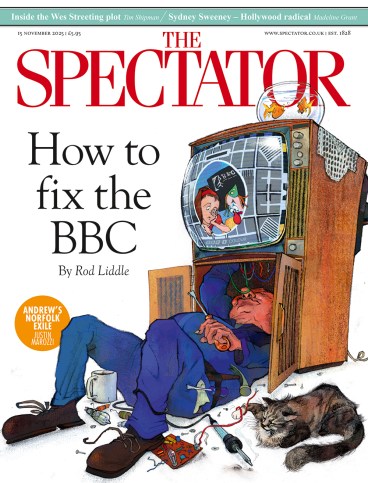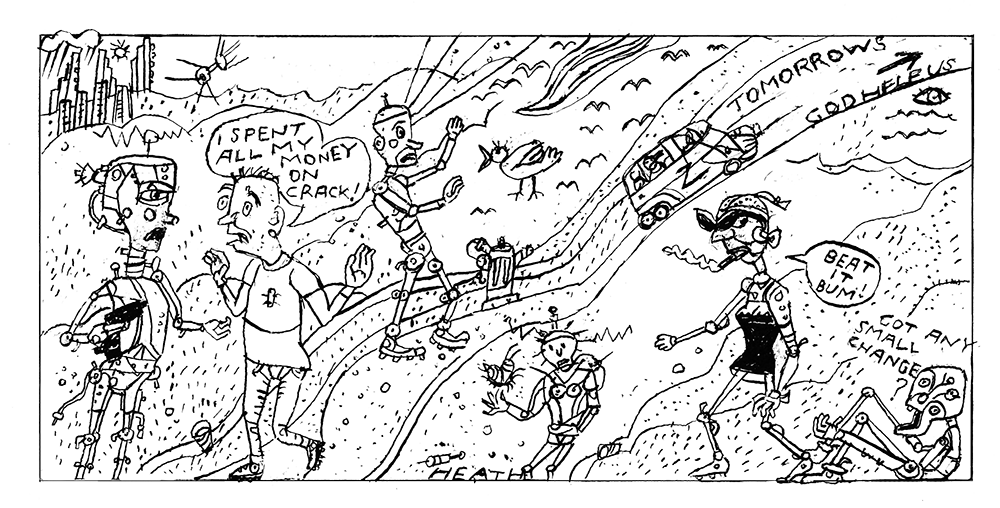
‘What’s missing?’ the tech titan Peter Thiel asks me, over lunch on the hummingbird-infested patio of his house in the Hollywood Hills. He gestures at the city of Los Angeles laid out in the haze below us. ‘Cranes!’ he explains. Thiel has argued for years that America has done most of its innovation in digital ‘bits’ instead of physical ‘atoms’, because bureaucracy, regulation and environmentalism have got in the way of the latter. While software has exploded, transport and infrastructure have stagnated. But over the next few days in Austin, Texas, and around San Francisco Bay, I see evidence this is changing. Travelling with the upbeat co-founders of the Rational Optimist Society, Stephen McBride and Dan Steinhart, we seek out companies that are inventing everything from cheaper supersonic jet engines to intelligent prosthetic arms for amputees. The founders, in mandatory black T-shirts, speak excitedly about the new opportunity to innovate in real things, thanks mainly to two factors: ChatGPT and Elon Musk.
Take Atom Bodies, the prosthetic-arm firm. Tyler Hayes, the founder, started three digital companies before creating robotic arms with 26 degrees of freedom in their fingers, hoping one day to make them capable of learning to interpret the wearers’ wishes. To his astonishment, large language models made this possible almost immediately. It now takes just five minutes for an amputee to teach the arm which nerve signals in his or her stump indicate a mental attempt to move a particular digit in a phantom limb.
In Austin we visit the Boring Company, one of Musk’s lower-profile ventures. In just 18 months it built several miles of car tunnels beneath the gigantic Las Vegas convention centre, with three ‘stations’ where you can catch a Tesla taxi. It did so at a fraction of the cost quoted by conventional tunnellers, by automating, streamlining and rethinking the way boring machines work. The tunnels already carry 35,000 passengers a day with an average wait time of ten seconds. Soon the entire city will be networked this way. Then I catch my first driverless Waymo robo-taxi. I find it takes about ten seconds to get used to trusting the non-driver as it weaves in and out of traffic at just the right speed; it is not even especially polite, bullying another driver who tries to cut in. Later that day a Waymo runs over a cat in San Francisco, to the horror (and secret delight) of Luddites who create a shrine of flowers in memory of the animal. But we have all done that.
Swing a cat out here and you hit a legend. The 86-year old tech visionary Stewart Brand, who coined the phrase ‘personal computer’, lives with his entrepreneur wife Ryan Phelan by a tidal creek north of the Golden Gate bridge. Two dozen of us gather to pick their olive harvest. What’s your biggest claim to fame, I ask Jennifer Saffo on the drive back to San Francisco. Her husband, the futurologist Paul Saffo, replies: ‘She coined the name for Microsoft Excel.’
Up a dusty track by the Pacific Ocean we find Zipline, a drone company that is delivering everything from take-aways in Dallas to swine semen in Rwanda (AI meets AI?). A self-steering droid descends on a fishing line from a drone hovering quietly 300ft above and scoops a package into its belly before being reeled back into the drone. Software simulation makes this hardware safe and efficient: bits to atoms again. So far Zipline drones have flown 120 million miles, or 500 times the distance to the moon, without a serious accident.
News breaks that James Watson has died. As well as discovering the secret of life in 1953, he broke new literary ground with his 1968 book The Double Helix, in which he paints himself as the villain: the original title was the intentionally ironic ‘Honest Jim’. When I wrote Francis Crick’s biography, Watson shared private correspondence about their brief but bitter feud over the book. Some of this does not present you in a good light, I said. I don’t care, he replied: the truth is what matters.
Over dinner in San Francisco with a bunch of absurdly young entrepreneurs who are doing everything from drug design to deciphering the Herculaneum scrolls, I ask them what they are worried about. China, most of them reply. It’s racing ahead in biotech, rapidly catching up in AI and showing no sign of slowing down, despite the increasing autocracy of its leader. Nobody mentions climate change. When I ask Thiel the same question, he says enviro-Marxism has kept the young off the housing ladder, giving them no stake in the future. As for Britain, the general view out here is that it is finished.







Comments